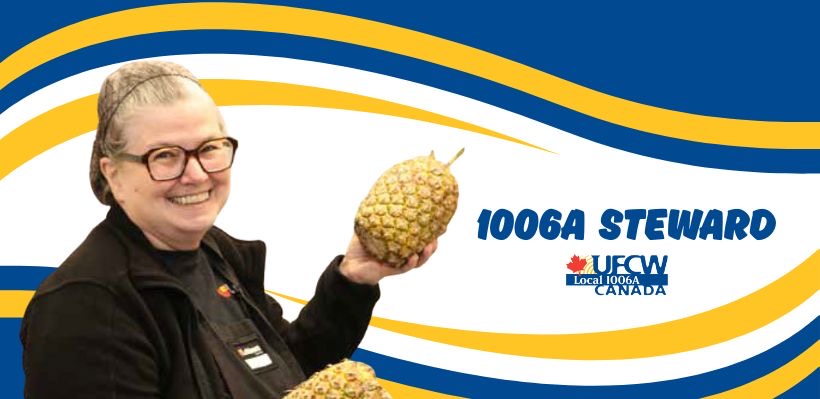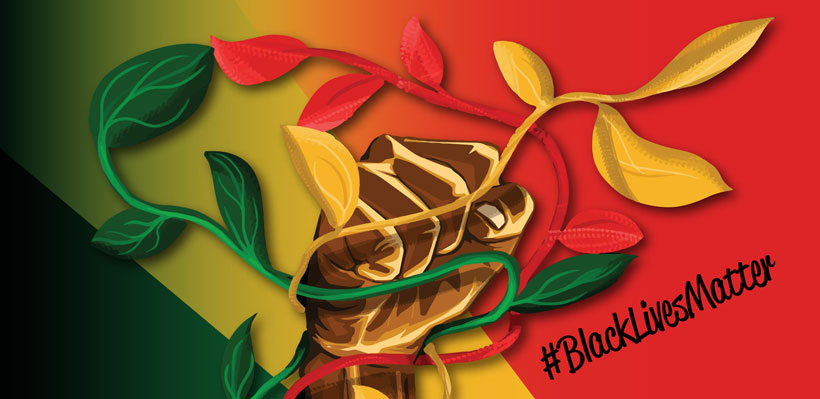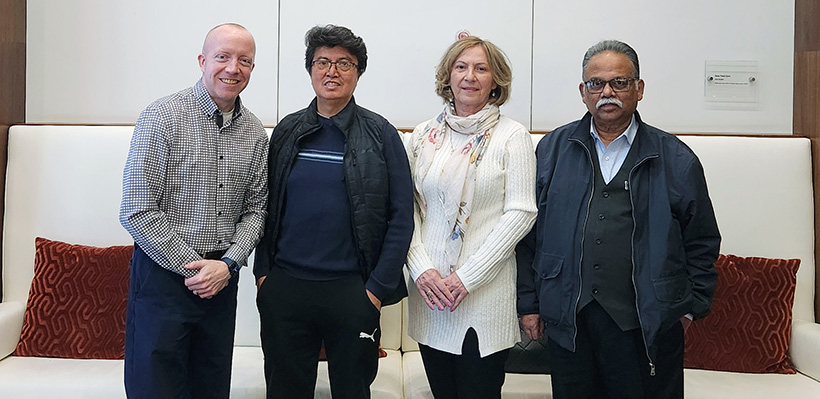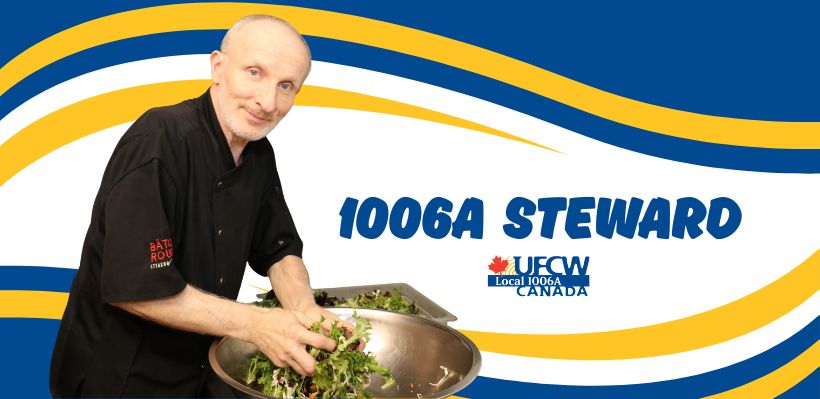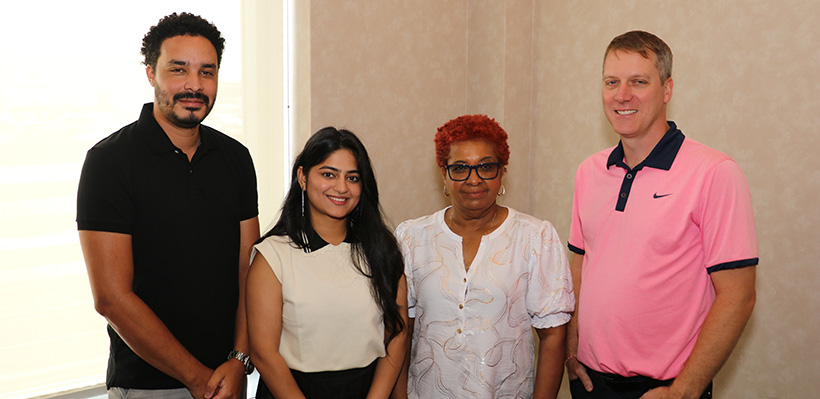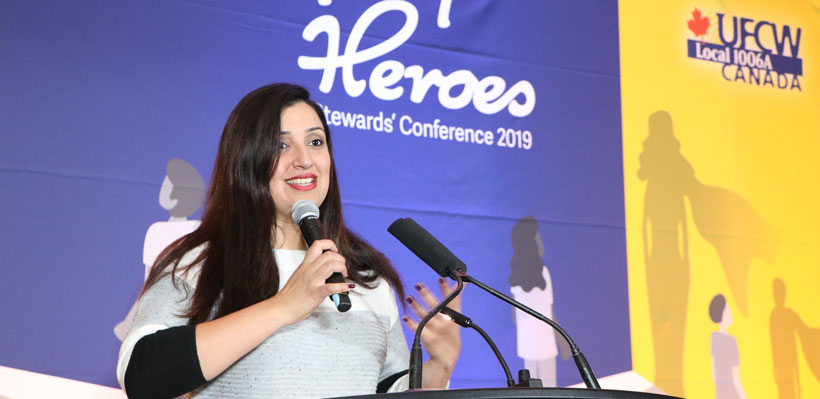
Samra Zafar’s story is one of hope and survival. At 16, Samra became a child bride through an arranged marriage. She was forced to move from the United Arab Emirates to marry a man in Canada. The 10-year-marriage was abusive from the start and took a toll, emotionally and physically. After much struggle, she escaped her marriage by finding the strength and courage within herself. Today, she is an award-winning international speaker, author, scholar, and social entrepreneur. Her book, A Good Wife, is now available for sale worldwide. Samra’s story is being turned into a TV series. Samra, who spoke at our Stewards’ Conference, shared her story with 1006Alive.
What did you think was going to happen with your marriage and what ended up happening?
When I arrived here, the marriage turned abusive very quickly, although at that time, I didn’t know what to call it. Initially, it was emotionally and verbally abusive and then over time it became physically abusive.
I wasn’t allowed to go out of the house, meet friends, have any interaction, independence or autonomy. I lost my entire agency, my belief and my identity. But during that time, I wanted to go to school so I kept pursuing my education, at home through distance-learning. I finished high school and worked as a babysitter to save money and started university after 10 years of marriage.
What point did you realize something was going very wrong in the marriage?
I always tried to fight back in different ways. When I started university, I realized what was happening to me was abuse. At school, I was being treated with kindness and respect and then, I would go home where I was ridiculed and abused. One day, I stumbled upon the health and counselling center on campus and through counselling, I realized it was not okay and I deserved better.
It took me another few years of counselling to increase my awareness and get courage and strength to leave. In my second year of undergrad, I left the marriage and moved to campus housing where I worked four or five campus jobs. My goal was to go to school full-time. I eventually graduated as a top student at University of Toronto.
Where did you find that courage to leave the abusive marriage?
Courage is something that you practice on an active basis. It’s not something that you’re born with overnight. We all have it in us. We have to find and develop it. I did that through regular counselling, reading, talking to positive people like my professors, my fellow students, and my mentors. I made friends and created a support system. Courage also came by really talking to myself. The first place courage comes from is within you and not from outside of you.
I also knew that if there was even a little chance of me being able to make it, I’m going to take that chance. I don’t want to regret it when I’m old and dying– why didn’t I do something about this when I still had the chance to? The biggest factor for me was also realizing there’s a generational cycle to abuse. Children who grow up witnessing violence in their families will often emulate that behavior.

I did not want my daughters to tolerate abuse of any kind or experience it. I didn’t want them to normalize it. I asked myself: if my daughters were being treated this way, what would I tell them? That’s when I eventually left.

Can you elaborate on how the kindness of others was instrumental to your journey?
On average, it takes seven times before a woman finally leaves her abuser and sometimes not at all. It took me four or five times before I was able to finally leave.
Leaving is very hard but what is even harder is staying away. It’s very easy to fall back into the same trap because that’s how you’re raised and conditioned to think. The biggest thing that keeps women going back is the isolation. They feel this big sudden gap because the abuser is no longer there. Even though he was an abuser and you know that this was not right, there was good there and there was attachment there. You make excuses for the abuser in your head. You talk yourself into going back and others talk you into going back.
What helped me that final time was that I had a positive support circle around me who helped me in those dark moments.
People would come to my aid. They would hold my hand. They would tell me that I will make it and I’m not alone.
I gained strength from that. I’m still on that journey of self-discovery, of believing in my self-worth, of knowing that I deserve the best.

I had to unlearn what was fed to me from a very young age.

What sort of further obstacles did you face after you left the marriage?
The biggest obstacle, for most women, is financial because abuse is about control. Your partner, usually an abusive partner, will control all the finances.
I didn’t have a job. I didn’t have any education. I didn’t have a career. I thought I would lose my children. I didn’t know how I’d be able to make it or how would I get work.
All those barriers were there. There’s also lack of knowledge. I believed for many years that if I left my marriage, I would lose my kid and be deported because he’s the one who sponsored me. That’s absolutely not true. But I didn’t know better because that’s what I was told by him and his family.
Especially in a lot of cases where women are from immigrant and refugee families, there’s elevated risk of cultural shame, isolation and stigma. In my culture and community, a single mother is a bad word. A separated woman is a scorned woman. A woman who operates her life like me is shameless.
I’ve received hate. I’ve received death threats. I’ve received all kinds of negative comments from people who think I’m defaming the culture and community for my self-promotion and to be famous. I only get all that at that level because I’m public about it. But even women who are not, and who are simply just trying to lead a normal life, they will often be faced with shame and ridicule from their own families and even the abuser’s family.

My brother-in-law one day called me and said, ‘What’s the point of you winning all these awards and scholarships, if you failed at the real purpose of being a woman. Shame on you.’

My own mother judged me many, many times. It’s very hurtful and very painful because those are the people you look to for love and approval. Oftentimes, that family and cultural pressure is what makes you go back.
Lack of self-confidence is another barrier. Confidence is something that’s built over time. Especially after an abusive relationship, your confidence in yourself and self-esteem is corroded to the point that you just don’t trust yourself. You doubt your abilities, you doubt your independence and your agency to make decisions and your voice.
That takes time to rebuild and requires a good positive support system which cheers you on and lifts you up.
How would you describe yourself while you were in the marriage and after you left?
The biggest achievement for me has been finding myself and knowing that my self-worth is not tied to my marital status, my body, the way I dress, my virginity, my ability to have children, my ability to clean a home and cook.
My self-worth is tied to how I see myself, my dreams, my goals, my ambitions, my individuality, my unique thoughts and ideas.
Everybody is worthy because everybody has unique thoughts and gifts and ideas that they are born with and they cultivate over their life. Your self-worth is not tied to your gender or any specific gender role that has been prescribed for you by society. I knew that through counselling, but to practice it daily and live my life that way by being unapologetically myself took time and I’m still on that journey.

When I look at myself today, the biggest win, the biggest source of confidence for me is to realize that my power lies in me being me.

Instead of trying to fit into a box in order for people to accept me or love me, I have enough people and amazing friends and mentors and everybody in my life who do love me for who I am. If somebody doesn’t, that doesn’t mean I’m not worthy. That just means they’re not my people.
Why did you want to write this book?
My story was the story of millions and millions of women and girls around the world who are suffering in silence because of lack of support, lack of agency, lack of awareness. I wanted to make a difference.
There are people out there who need to hear what I have to say and who may realize their own courage because of my story. It’s an opportunity for me to turn a negative experience into a positive force for change.
Abuse is the most prevalent and most hidden social injustice in our society because there’s so much shame and stigma and taboo around it. There’s so much misunderstanding and myths. We need to do our part in breaking the silence because millions are still suffering in silence.
What is the main advice you would give to someone who is suffering from abuse in their marriage, whether physical or emotional?
Build a support system around you, educate yourself, forgive yourself. Leaving is not a one-step process.
Oftentimes, what happens when you leave and then you go back, you beat yourself up for that because you’re like, ‘I can’t do it.’ But every time you try to leave, you’re one step closer to finally leaving.
Be kind to yourself, forgive yourself and build a support system around you. Find people to talk to who resonate with the voice in your head that tells you that you can do it, you’re not alone.
You absolutely do deserve better. No one has the right to treat you that way for any reason.
Is there anything else you would like to add?
Women often stay in abusive relationships because they think it’s the best for their children. There’s a growing mountain of evidence that there’s a huge detrimental effect on children’s mental health because of exposure to family violence.
I saw my father being abusive and then I tolerated it in my marriage. That’s the cycle that I wanted to break with my kids. The trauma of abuse is bad on children’s mental health. Don’t stay for the sake of your kids, leave for the sake of your kids.
Teach kids about healthy behaviors, about empathy and kindness, human rights, how to treat other people with respect and what respectful relationships look like.
Abuse is insidious. It creeps up on you and builds with time. When we teach our children about early signs, we teach them to protect themselves. Power lies in education, knowledge and awareness.
RESOURCES
ONTARIO
Assaulted Women’s Helpline – Free, confidential counselling, emotional support, safety planning and referrals for women needing a shelter, legal advice or other supports. Available 24/7, province-wide in more than 100 different languages including 17 Aboriginal languages.
1-866-863-0511 | TTY 1-866-863-7868 | Rogers, Fido, Bell and Telus – #SAFE (#7233)
canadianlabour.ca/issues-research/domestic-violence-work



